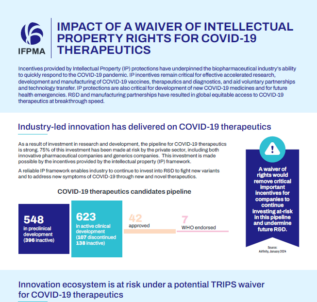Open-ended meeting of member States (CEWG)
Open-ended meeting of Member States on the follow-up of the report of the Consultative Expert Working Group on Research and Development: Financing and Coordination (CEWG)
Delivered by Mario Ottiglio, Associate Director, Public Affairs & Global Health Policy Check against Delivery (26 November 2012)
Thank you on behalf of the International Federation of Pharmaceutical Manufacturers and Associations (IFPMA), for the opportunity to provide our perspective on this topic. We represent the global R&D pharmaceutical industry, whose primary contribution to global health is the development and supply of innovative medicines and vaccines.
The CEWG has provided a comprehensive basis for discussion on increasing coordination and financing particularly in type II and III diseases and IFPMA welcomed their conclusion that new models would be supplementary instruments to address challenges that cannot be fully tackled trough the current innovation paradigm.
During this complex and lengthy debate we have heard many times that something must be done – we agree.
WHO Secretariat’s report has added significant value by presenting options driving the debate forward on to concrete steps. It’s time to seize the opportunity to deliver tangible outputs.
Mr Chair: we need a mix of vision and pragmatism.
This means that whatever is agreed today, it is going – probably – to deliver results only in a decade. But how do we make sure those results will match actual health needs at that time? And how can we nurture current efforts in the meantime?
These are difficult challenges but we believe that understanding key research gaps is a precondition to addressing them.
In this spirit, we welcome the idea of undertaking a systematic and standardized review of unmet needs for these diseases and of R&D flows and research capacity in order to develop a clear picture of needs, gaps and priorities.
There is a need to address those areas that are less well served by current efforts, and agree on how to identify those priorities, how to set specific targets and how to guarantee that whatever decision Member States take is going to be financially viable and clinically relevant.
While we must not forget that the scientific challenges that some of these diseases pose are significant, the good news is that R&D for type II and III is ongoing: we are not starting from scratch.
Data show that IFPMA member companies’ R&D programs for these diseases have increased over the last years with an overall 93 projects in 2011. 75% of them are being carried out through collaborative approaches. As well, there is an opportunity today to leverage existing initiatives for example the TDR Programme or the WIPO Re:Search.
The IFPMA and its members companies and associations stand ready to provide expertise and to assist further in this process so crucial to achieve our shared commitment to innovation and access to medicines for unmet medical needs.
About IFPMA
The International Federation of Pharmaceutical Manufacturers and Associations (IFPMA) represents over 90 innovative pharmaceutical companies and associations around the world. Our industry’s almost three million employees discover, develop, and deliver medicines and vaccines that advance global health. Based in Geneva, IFPMA has official relations with the United Nations and contributes industry expertise to help the global health community improve the lives of people everywhere. For more information, visit ifpma.org.
Learn more




